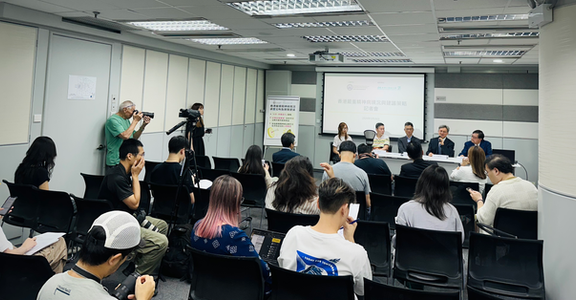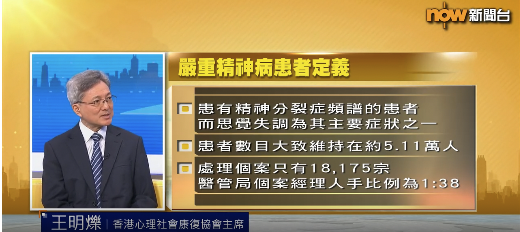Press Conference Case Sharing: Survey on Severe Mental Illness & Policy Recommendations
- Prologue Editorial

- Jun 2, 2024
- 6 min read
Updated: Nov 18, 2024
Hong Kong is hectic, fast-paced, and densely populated, making mental health challenges faced by the public worthy of wider attention and appropriate support. On June 2, 2023, a tragic incident in Diamond Hill involving a severe mental illness patient raised public awareness about the treatment and support for those with severe mental illnesses. Nearly a year after the incident, the Hong Kong Association of Psychosocial Rehabilitation (HKAPR) conducted a telephone survey in January 2024 to assess public awareness of severe mental illnesses. The association recently released the survey results and policy recommendations, supported by the Mental Health Association of Hong Kong (MHAHK). At the press conference, a family member of a schizophrenia patient also spoke up, sharing the challenges and expectations of being a caregiver.

(From the left) Mr. Chan, Carer; Ms. Yuen, Social worker from MHAHK; Mr. Ching, Director of MHAHK; Prof. Ng, Member of HKAPR; Dr. Yeung, Vice Chairman of HKAPR; Dr. Wong, Chairman of HKAPR; Ms. Lam, Honorary Secretary of HKAPR; Dr. Tam, Member of HKAPR
In recent years, the number of people with severe mental illnesses in Hong Kong has remained at around 51,100. According to the Hospital Authority's definition, patients with severe mental illnesses refer to those with schizophrenia spectrum disorders, with psychosis being one of the main symptoms.
This survey interviewed 850 citizens aged 18 and above to understand their self-assessment of their knowledge about severe mental illnesses. The results were then weighted according to Hong Kong's population age distribution.
The survey results show that the general public lacks the knowledge of severe mental illnesses. Only 11.3% of respondents expressed that they understand the main symptoms of severe mental illnesses (such as psychosis). Furthermore, less than 9% of respondents believe they know how to seek help and manage the situation if their loved ones were to unfortunately diagnosis with severe mental illness. The association advocates for the government to adopt a dual strategy of "boosting manpower and utilising injectable medication," regularly collect data to evaluate the effectiveness of different treatment options for patients, and strengthen public education including mental health first aid.
"The shortage of medical personnel and case managers places the responsibility of caring for patients on their families or community members. However, the public's lack of awareness and understanding of the treatment and management of such illness (psychosis) makes it even more difficult to ensure that patients take their prescribed medication. This situation is detrimental to patients, carers, and the healthcare system."

Dr. Wong, Chairman of HKAPR and Psychiatrist
Dr. Wong, Chairman of HKAPR and Psychiatrist, explained the survey results, stating: "Literature research shows that about half of patients with psychosis who take oral medication are unable to fully adhere to their prescribed medication, increasing their risk of relapse and hospitalization. Even professional medical personnel can only use questionnaires or calculate the remaining amount of drugs to determine whether patients are taking their medication as prescribed. The shortage of medical personnel and case managers places the responsibility of caring for patients on their families or community members. However, the public's lack of awareness and understanding of the treatment and management of such illness (psychosis) makes it even more difficult to ensure that patients take their prescribed medication. This situation is detrimental to patients, carers, and the healthcare system."
Furthermore, less than 5% of respondents believe that currently there is adequate support for the carers of individuals with severe mental illnesses. According to the 2017 Mental Health Review Report, the ratio of case managers to severe mental illness patients was 1:47 at that time. After the tragedy in Plaza Hollywood, the Hospital Authority proposed measures to increase the number of case managers. Currently, the relevant staff-to-patient ratio has been reduced to 1:38. However, this figure only covers 18,175 cases, which represents merely one-third of the total number of severe mental illness patients.
"...as the SAR government is actively increasing medical personnel and case managers, it should also consider the earlier use of Second-Generation Long-Acting Injectable Antipsychotics during patients' treatment programme, after assessment and deemed appropriate."

Dr Yeung, Vice Chairman of HKAPR and Psychiatrist
Dr Yeung, Vice Chairman of HKAPR and Psychiatrist stated, "While continuously increasing the number of case managers is important, it is extremely difficult to benefit all patients and achieve an ideal staff-to-case ratio. Therefore, while the SAR government is proactively increasing medical personnel and case managers, it should also consider the earlier use of Second-GenerationLong-Acting Injectable Antipsychotics during patients' treatment programme, after assessment and deemed appropriate. The survey also shows that less than 5% of respondents believe they understand the differences in treatment efficacy between the new generation and the previous generation of long-acting injectables and oral medications. Over 60% of respondents expressed a significant lack of understanding in this area, highlighting that the public generally lacks clarity on the available medical options for treating severe mental illnesses."
"...if the society magnifies the issues of severe mental illness, not only will it fail to address the problem effectively, but it will also lead to stigmatization and marginalization, causing stress for patients and their families, and preventing them from integrating into the society."

Prof. Ng, Professor at the Department of Social Work and Social Administration, HKU, and Member of HKAPR
Prof. Ng, Professor at the Department of Social Work and Social Administration, HKU, and Member of HKAPR also stated, "The survey also found that 70.7% of respondents believe that there is insufficient support in the society for carers of individuals with severe mental illnesses. If the society can accept them and achieve early detection and treatment, their chances of recovery would greatly improve. On the contrary, if the society magnifies the issues of severe mental illness, not only will it fail to address the problem effectively, but it will also lead to stigmatization and marginalization, causing stress for patients and their families, and preventing them from integrating into the society."

3 Suggestions proposed by the Hong Kong Association of Psychosocial Rehabilitation
1. The SAR government should adopt a dual strategy addressing both manpower and medication. While proactively increasing the number of medical personnel and case managers, it should also apply second-generation long-acting injectables (LAIs) earlier in the treatment programme for patients with severe mental illnesses. For example, when it is found that a patient has compliance issues with oral medications, second-generation LAIs should be prescribed immediately. The higher medication compliance and lower relapse and hospitalization rates associated with LAIs can effectively reduce the manpower pressure and treatment costs on the healthcare system.
2. The government and the Hospital Authority should regularly collect and analyze data on the relapse and hospitalization rates of patients using oral medications and first-and second-generation LAIs to evaluate the local effectiveness of different treatment methods. This data analysis will contribute significantly in assessing the cost-effectiveness of various treatment options in the future.
3. The government should conduct more comprehensive public education campaigns, enhancing publicity and educational efforts to improve public awareness towards severe mental illnesses and the correct ways to seek help.
Media Coverage
The survey and recommendation report has drawn 36 pieces of media coverage, including two exclusive live TV interview programs:
星島日報 - 調查揭港人對嚴重精神病認知不足 少於一成受訪者懂求助處理方法 [Link]
東方日報 - 近9成受訪者對精神病患認知不足 [Link]
SCMP - Fewer than 9% of Hongkongers know how to get help when faced with schizophrenia: survey [Link]
中通社 - 調查:港人對嚴重精神病認知不足 少於一成懂處理方法 [Link]
AM730 - 增用藥依從性 減思覺失調復發 [Link]
橙新聞 - 調查發現大眾對嚴重精神病缺乏認知 不足一成受訪者懂求助處理方法 [Link]
大公報 - 調查:市民對嚴重精神病認知不足 [Link]
信報 - 團體倡加強精神病認知教育 [Link]
集誌社 - 精神健康|僅一成受訪市民知嚴重精神病症狀 不足9%了解求助和處理 [Link]
Media Interviews
香港電台 香港電台第五台及港台31台電視節目 - [Link]

















Comments